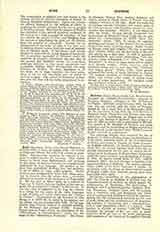

Bude (BUDAEUS), GUILLAUME, French Hellenist, b. at Paris, 1467; d. there, August 22, 1540. He studied at Paris and Orleans, but with little success or application. Subsequently, however, he seemed to ac-quire a sudden passion for learning. After taking lessons in Greek from Hermonymus, and profiting by the advice of Joannes Lascaris, he attained great proficiency in that language. He studied at the same time, philosophy, theology, law, and medicine, in all of which he made rapid progress. Bude’s abilities were recognized by Louis XII, whose secretary he became after his return from a successful embassy on occasion of the coronation of Pope Julius II. He was sent to Rome again on a mission to Pope Leo X (1515), but was recalled at his own request end accompanied Francis I in his travels. It was then that he suggested to the king the creation of a college for the study of the three languages (Greek, Hebrew, and Latin), afterwards the “College de France“. Empowered to ask Erasmus to take charge of it (1517-18), he failed in his mission, and the college was not founded until 1530. At his suggestion, also, Francis declined to prohibit printing, as the Sorbonne had advised (1533). Literary France owes to Bude’s efforts the foundation of the “Bibliotheque de Fontainebleau”, which was the origin of the “Bibliotheque Nationale”. His letters to Erasmus, Thomas More, Sadolet, Rabelais, and others, written in Greek, Latin, or French, were the delight of scholars of the time. Bude was suspected of leanings towards Calvinism, and certain parts of his correspondence with Erasmus seemed to countenance this suspicion. However, it was disproved after his death. Having already translated into Latin many of Plutarch’s Lives (1502-05), he published his “Annotationes in XXIV libros Pandectarum” (Paris, 1508), in which, by applying philology and history to the Roman law, he revolutionized the study of jurisprudence. Bude’s treatise on Roman coins and weights, “De asse et partibus ejus” (Venice, 1522), was the best book on the subject written up to that time. In 1520 he published a philosophical and moral dissertation, “De contemptu rerum fortuitarum”; in 1527, “De studio litterarum”, in which he urges youth not to neglect their literary studies. Greek, however, was his favorite study, and we have from him, “Commentarii linguae graecae” (Paris, 1529), which greatly advanced the study of Greek literature in France, “De transitu helenismi ad Christianismum” (Paris, 1534), and various other works of similar scope though of minor importance. His complete works were published at Basle in 1557.
M. DE MOREIRA

